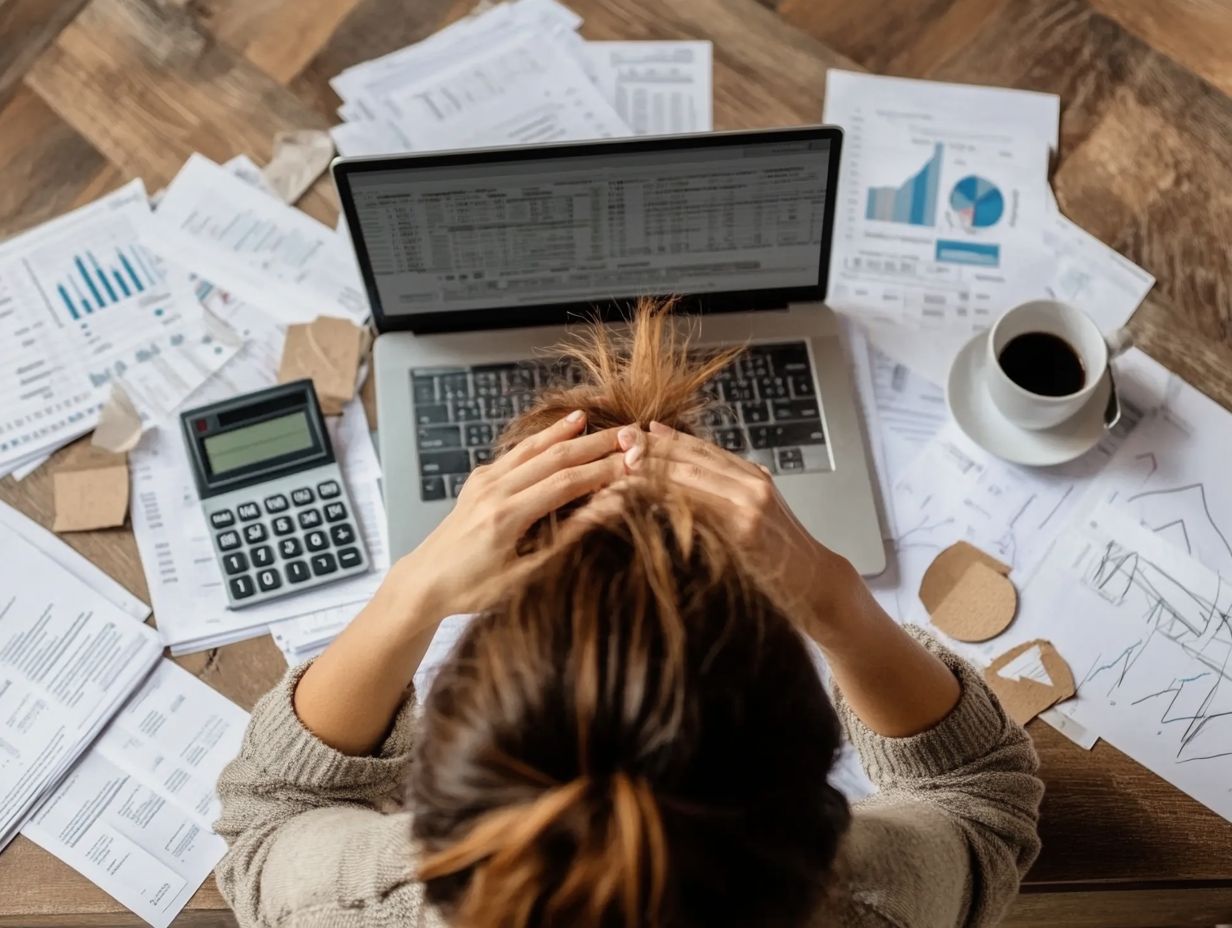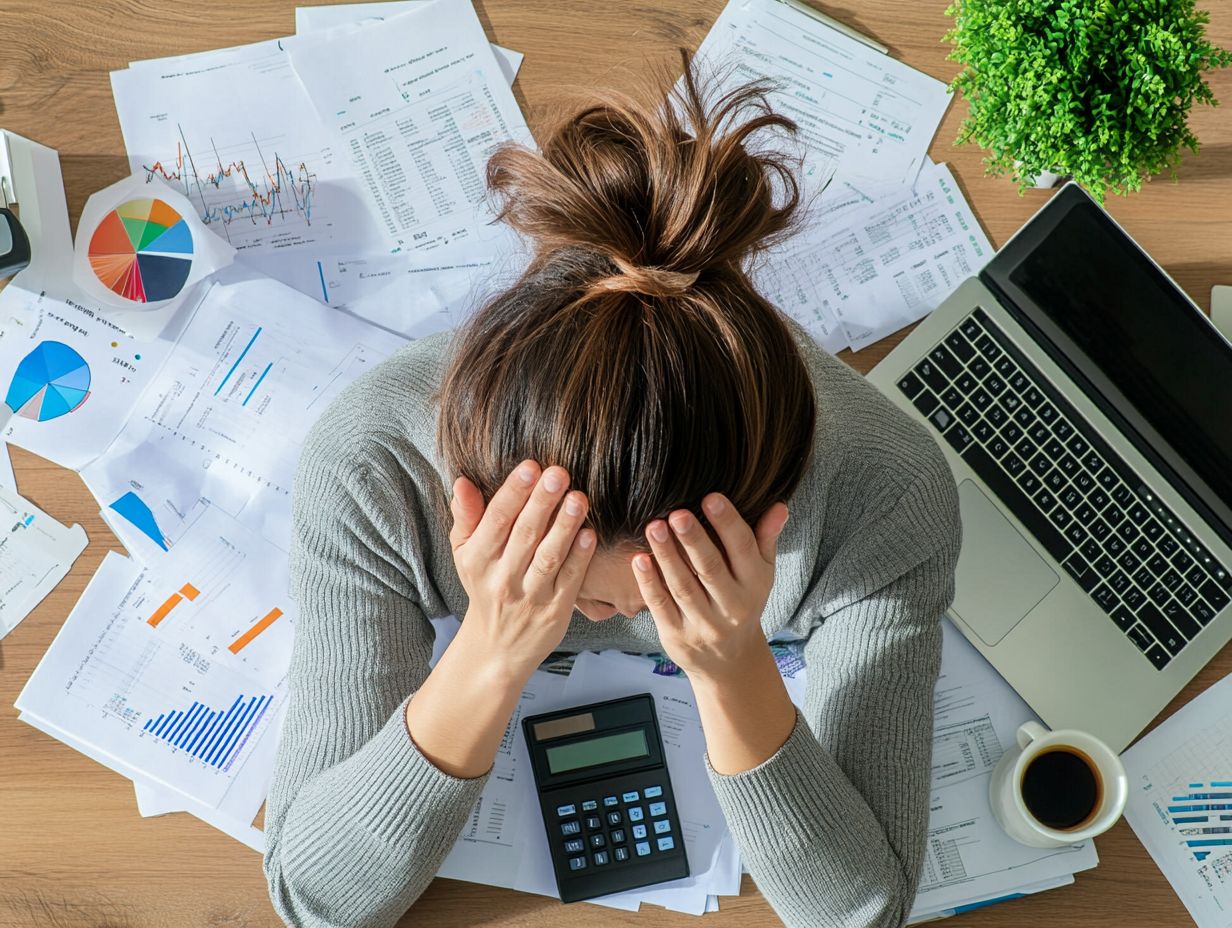Dealing with Unpaid Invoices: Financial Strategies
Unpaid invoices can cripple your business! Act now to protect your cash flow. They can severely disrupt operations by causing cash flow issues that threaten their financial health. When customers fail to pay their bills on time, it creates a ripple effect on accounts receivable and administrative expenses, potentially resulting in late payment fees and damaging the company’s reputation in the marketplace.
This financial strain can complicate debt recovery efforts. Hiring collection agencies incurs additional costs and may create tension with clients, ultimately affecting accounts receivable. Although the ability to charge a late payment fee can help alleviate some of these issues, it may also harm relationships and foster resentment among customers.
Establishing clear payment terms and implementing proactive invoicing strategies can help mitigate the risk of unpaid invoices while fostering customer relationships that are vital for future business opportunities. Effective credit control measures are crucial during periods of unpaid invoices.
This article explores the various impacts and risks associated with unpaid invoices, as well as best practices for invoicing and payment terms that can help mitigate these effects. Using invoicing software for better invoice management can help streamline the process of tracking outstanding payments.
It also outlines strategies for collecting outstanding payments. If payment deadlines are not met, implementing a consistent follow-up system can gently remind clients of their obligations without being overly aggressive. If necessary, a demand payment letter can be drafted, or legal action may be taken, but this should only be considered if the relationship with the client appears irreparable.
Contents
- Key Takeaways:
- The Impact of Unpaid Invoices on Business
- Preventing Unpaid Invoices
- Strategies for Collecting Unpaid Invoices
- Legal Options for Pursuing Unpaid Invoices
- Managing Cash Flow During Unpaid Invoices
- Avoiding Unpaid Invoices in the Future
- Frequently Asked Questions
- What are some financial strategies for dealing with unpaid invoices?
- How can I prevent unpaid invoices in the first place?
- Should I offer discounts for early payment?
- Is it a good idea to hire a collection agency for unpaid invoices?
- What are some consequences of not dealing with unpaid invoices?
- How can I track and manage unpaid invoices and improve cash flow?
Key Takeaways:
- Unpaid invoices can have serious consequences for a business, including financial losses and damaged relationships.
- Preventing unpaid invoices is key to maintaining a healthy cash flow. Implementing best practices in invoicing and payment terms can help avoid non-payment.
- When dealing with unpaid invoices, effective communication and negotiation can help resolve the issue. However, if necessary, legal action can be taken to pursue payment.
The Impact of Unpaid Invoices on Business
Unpaid invoices can severely disrupt the operations of small businesses by causing cash flow issues that threaten their financial health. When customers fail to pay their bills on time, it creates a ripple effect on accounts receivable and administrative expenses.
Consequences and Risks
Unpaid invoices can seriously hurt your business finances and cause damage to reputation. To navigate cash flow problems, it is crucial to prioritize expenses and identify areas where costs can be reduced without compromising quality.
When businesses face unpaid invoices, they often struggle with cash flow, hindering daily operations and making it challenging to meet payroll and cover essential expenses. This financial strain can also complicate collecting debts, as hiring collection agencies incurs additional costs and may create tension with clients.
Although the ability to charge late payment fees can help alleviate some of these issues, it may also harm relationships and foster resentment among customers. Repeated issues with unpaid invoices can ultimately damage a small business’s reputation, adversely affecting future sales and growth opportunities.
Preventing Unpaid Invoices
Don’t let unpaid invoices cripple your cash flow and client relationships! Establishing clear payment terms and implementing effective billing practices can help mitigate the risk of unpaid invoices.
Best Practices for Invoicing and Payment Terms
Utilizing invoicing software and clearly defining payment terms are best practices that can significantly reduce the risk of unpaid invoices for small businesses.
Automating routine tasks such as invoice generation, reminders, and payment tracking through effective invoicing software creates a streamlined workflow that minimizes errors and saves time. This technology enables businesses to maintain a professional image by ensuring that all invoices are consistent and accurately reflect the services provided.
Offering an early payment discount can motivate clients to pay promptly. Discussing a payment plan could also provide flexibility for clients facing financial constraints, helping negotiate terms that are feasible for both parties.
These features collectively help businesses decrease the occurrence of late payments.
Strategies for Collecting Unpaid Invoices
Here are three effective methods for collecting unpaid invoices:
- Following up with clients
- Clearly communicating with them
- Negotiating payment terms
Effective Communication and Negotiation
Effective communication and negotiation are essential tools for businesses in successfully collecting unpaid invoices, as they help maintain relationships while fulfilling obligations. Various communication strategies can enhance the outcome of invoice negotiations.
For instance, a simple phone call can uncover any misunderstandings or financial challenges that may be hindering a client’s ability to pay on time. Keeping an open line of communication encourages clients to share their struggles, fostering a collaborative environment.
If payment deadlines are not met, implementing a consistent follow-up system can gently remind clients of their obligations without being overly aggressive. If necessary, a demand payment letter can be drafted, or collection agencies may be enlisted, but this should only be considered if the relationship with the client appears irreparable.
Legal Options for Pursuing Unpaid Invoices
Legal action should be considered a last resort for small businesses seeking to collect unpaid invoices. It may become necessary to ensure that these businesses can meet their own financial obligations when all other methods of invoice collection have been exhausted.
Always explore all other options before considering legal action to protect your business’s financial health.
When to Consider Legal Action
Deciding when to pursue legal action for unpaid invoices is a sensitive matter that requires careful analysis of the circumstances, particularly in light of the company’s financial limitations. Certain signs indicate that the situation has escalated to a point where legal action may be necessary. These signs include ignoring communication attempts or consistently violating the agreed-upon payment schedule.
Before reaching that stage, businesses should prioritize communication with their customers to address the issue. This could involve sending friendly reminders, discussing any payment difficulties, or suggesting alternative payment plans. Keeping an open line of communication often encourages clients to share their struggles, fostering a genuine desire to find a mutually satisfactory solution before resorting to more extreme measures.
Only after exhausting these options should one consider the possibility of taking legal action.
Managing Cash Flow During Unpaid Invoices
Manage your cash flow effectively even when invoices go unpaid by planning carefully. Robust credit management practices are essential.
Strategies for Maintaining Financial Stability
Small businesses can achieve financial stability despite cash flow issues stemming from unpaid invoices by implementing strategic budgeting and exploring various payment options.
To effectively navigate these challenges, it is crucial to prioritize expenses and identify areas where costs can be reduced without compromising quality. Utilizing financial tools and software can assist in tracking expenditures and forecasting needs, enabling more well-considered choices.
Diversifying payment options—such as accepting credit cards, digital wallets, or installment payments—can significantly improve cash flow and enhance customer satisfaction. By adopting a comprehensive approach to finances, businesses can not only mitigate risks but also establish a more resilient economic foundation for future growth.
Avoiding Unpaid Invoices in the Future
Small businesses can prevent unpaid invoices in the future by establishing clear payment expectations, implementing proactive invoicing practices, and maintaining open communication with clients.
Steps to Prevent Future Non-Payment
Preventing non-payment in the future requires a combination of proactive invoicing, clear payment terms, and effective client communication strategies. Small businesses can enhance their invoicing process by sending payment reminders well ahead of due dates. This approach signals to clients that their payments are being monitored, reducing the likelihood of forgotten payments.
Regularly reassessing and adjusting payment terms ensures that both the business and the client have a mutual understanding of expectations as projects evolve. Building strong relationships through consistent communication motivates clients to pay their invoices on time, leading to fewer overdue payments.
Frequently Asked Questions
What are some financial strategies for dealing with unpaid invoices?
There are a few options you can consider, such as offering discounts for early payment, implementing late fees, or hiring a collection agency. If payment deadlines aren’t met, consider hiring a collection agency, but use this option as a last resort.
How can I prevent unpaid invoices in the first place?
Let’s tackle the challenge of unpaid invoices head-on! One way is to have clear payment terms and policies and communicate them to your clients upfront.
You can also request a deposit or set up a payment schedule.
Should I offer discounts for early payment?
This depends on your business and cash flow needs. Offering a small discount, like 2-3%, can encourage clients to pay on time and enhance your cash flow.
However, ensure that the discount is beneficial for your business.
Is it a good idea to hire a collection agency for unpaid invoices?
Hiring a collection agency can be effective, but they usually charge a percentage of the collected amount. This can reduce your profits.
Try other methods first before hiring a collection agency.
What are some consequences of not dealing with unpaid invoices?
Ignoring unpaid invoices can hurt your finances and harm your business reputation. This is especially true for small businesses.
Address them quickly and professionally to maintain good client relationships.
How can I track and manage unpaid invoices and improve cash flow?
Using invoicing software like Quickbooks or Xero can help you track unpaid invoices and their due dates. These tools allow you to set payment reminders and follow up with clients.
Timely follow-ups are crucial for healthy cash flow.










